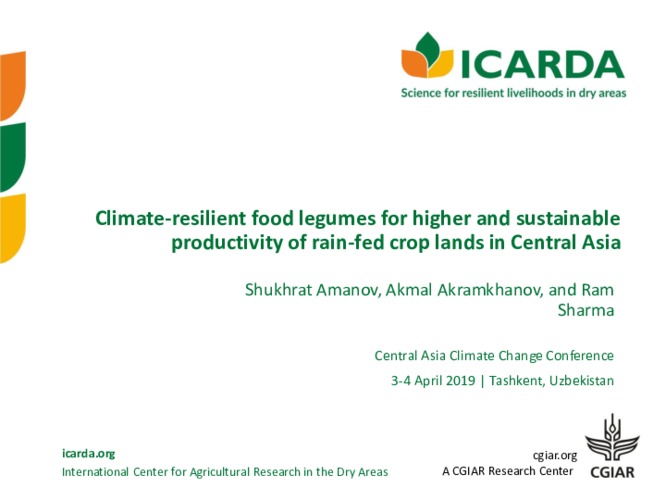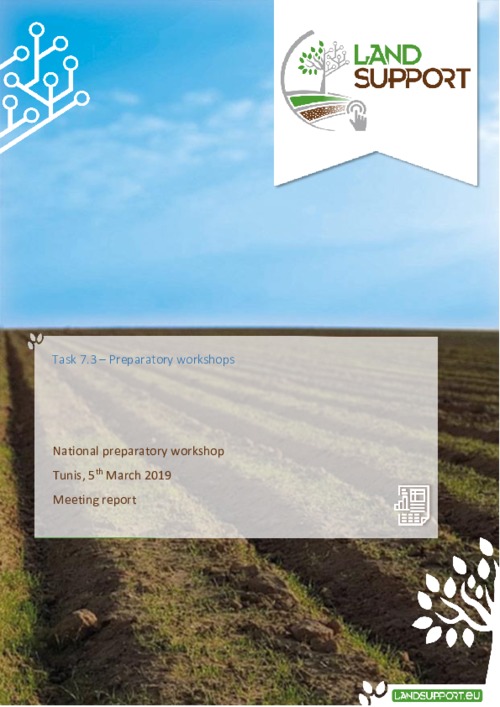Location
The International Center for Agricultural Research in the Dry Areas (ICARDA) was established in 1977. It is one of 15 such centers supported by the CGIAR. ICARDA’s founding mandate to promote agricultural development in the dry areas of developing countries remains highly relevant today.
ICARDA works with a tight focus on the problem-solving needs of resource-poor farmers, achieving this through the in-field delivery of its research outputs. Although global food production has increased by 20 per cent in the past decade, food insecurity and poverty remain widespread, while the natural resource base continues to decline.
International research centers such as ICARDA, which have helped drive previous improvements, continue to deliver new technologies to support sustainable growth in agriculture, and crucially, to work with a wide range of partners to accelerate the dissemination of these technologies.
ICARDA’s biggest strength is its staff – 600 highly skilled men and women from 32 countries. Our research and training activities cover crop improvement, water and land management, integrated crop-livestock-rangeland management, and climate change adaptation.
Other interventions include:
- Water harvesting - supplemental irrigation and water-saving irrigation techniques
- Conservation agriculture methods to reduce production costs and improve sustainability
- Diversification of production systems to high-value crops – horticulture, herbal and medicinal plants
- Integrated crop/rangeland/livestock production systems including non-traditional sources of livestock feed
- Empowerment of rural women – support and training for value-added products.
The ICARDA genebank holds over 135,000 accessions from over 110 countries: traditional varieties, improved germplasm, and a unique set of wild crop relatives. These include wheat, barley, oats and other cereals; food legumes such as faba bean, chickpea, lentil and field pea; forage crops, rangeland plants, and wild relatives of each of these species.
ICARDA’s research portfolio is part of a long-term strategic plan covering 2007 to 2016, focused on improving productivity, incomes and livelihoods among resource-poor households.
The strategy combines continuity with change – addressing current problems while expanding the focus to emerging challenges such as climate change and desertification.
We work closely with national agricultural research systems and government ministries. Over the years the Center has built a network of strong partnerships with national, regional and international institutions, universities, non-governmental organizations and ministries in the developing world and in industrialized countries with advanced research institutes.
THE ‘DRY AREAS’
Research and training activities cover the non-tropical dry areas globally, using West Asia, North Africa, Central Asia and the Caucasus as research platforms to develop, test, and scale-out new innovations and policy options.
Dry areas cover 41 per cent of the world’s land area and are home to one-third of the global population. About 16 per cent of this population lives in chronic poverty, particularly in marginal rainfed areas. The dry areas are challenged by rapid population growth, frequent droughts, high climatic variability, land degradation and desertification, and widespread poverty. The complex of relationships between these challenges has created a "Poverty Trap."
Members:
Resources
Displaying 36 - 40 of 431Adoption of Conservation Agriculture Technologies by Smallholder Farmers in the semiarid region of Tunisia: Resource constraints and partial adoption
Tunisia, like many other countries, suffers from land degradation. Conservation agriculture is among the proper solutions to overcome this issue. The objective of our investigation is to determine the factors that influence the adoption of CA in Siliana, one of Tunisia’s most affected regions by erosion. A field survey was conducted to collect adoption data used for descriptive analysis, and for the estimation of a choice model (Logit).
Climate-resilient food legumes for higher and sustainable productivity of rain-fed crop lands in Central Asia
Presentation on "Climate-resilient food legumes for higher and sustainable productivity of rain-fed crop lands in Central Asia" submitted during the Central Asia Climate Change Conference, 3-4 April 2019. Tashkent, Uzbekistan.
Frameworks, tools, and approaches for the assessment of rangeland governance
This document aims to contribute to the empirical development of effective approaches for the assessment of rangeland governance at local levels, and provide insights about major governance drivers through the quantitative assessment of their effects. Our focus is an application of the Bayesian Belief Network (BBN) methodology to assess key variables that affect the probability of good rangeland governance under contrasting contexts of land tenure in Southern Tunisia.
National preparatory workshop in Tunisia
The living lab approach underlying LANDSUPPORT activities is aimed at involving policy and decision makers and potential users from the very beginning and throughout all project phases, ensuring that the delivered DSS tools can actually be used.
With this aim preparatory workshops bringing together policy makers in land management have been planned at EU/national/regional/local level. The outcomes of national and local workshops will feed into the EU workshop in order to ensure that local and national instances are brought forward at the EU level.
Participatory Survey on Soil and Water Conservation Practices and Water Harvesting Systems in the Savannah Belt of Northern Nigeria
The Climate Change Adaptation and Agribusiness Support Programme (CASP) of the Federal Ministry of Agriculture and Rural Development of Nigeria (FMARD) aims at mainstreaming climate change adaptation measures in the savannah belt of Northern Nigeria, through a landscape rehabilitation approach focused on sustainable land management. Demonstration sites will be established across seven Nigerian states (Borno, Yobe, Jigawa, Katsina, Zamfara, Kebbi, Sokoto).







